-
 Bitcoin
Bitcoin $117500
2.15% -
 Ethereum
Ethereum $3911
6.19% -
 XRP
XRP $3.316
10.79% -
 Tether USDt
Tether USDt $1.000
0.01% -
 BNB
BNB $787.2
2.24% -
 Solana
Solana $175.2
4.15% -
 USDC
USDC $0.9999
0.00% -
 Dogecoin
Dogecoin $0.2225
8.40% -
 TRON
TRON $0.3383
0.28% -
 Cardano
Cardano $0.7868
6.02% -
 Stellar
Stellar $0.4382
9.34% -
 Hyperliquid
Hyperliquid $40.92
7.56% -
 Sui
Sui $3.764
7.63% -
 Chainlink
Chainlink $18.48
10.66% -
 Bitcoin Cash
Bitcoin Cash $582.1
1.88% -
 Hedera
Hedera $0.2601
6.30% -
 Avalanche
Avalanche $23.33
4.94% -
 Ethena USDe
Ethena USDe $1.001
0.02% -
 Litecoin
Litecoin $122.3
2.04% -
 UNUS SED LEO
UNUS SED LEO $8.969
-0.27% -
 Toncoin
Toncoin $3.339
0.86% -
 Shiba Inu
Shiba Inu $0.00001287
4.30% -
 Uniswap
Uniswap $10.43
7.38% -
 Polkadot
Polkadot $3.861
5.08% -
 Dai
Dai $1.000
0.02% -
 Bitget Token
Bitget Token $4.513
3.41% -
 Monero
Monero $267.7
-6.18% -
 Cronos
Cronos $0.1499
4.14% -
 Pepe
Pepe $0.00001110
5.15% -
 Aave
Aave $284.9
8.28%
What is IDO (first decentralized exchange issuance)?
IDOs, using decentralized exchanges, offer a potentially fairer cryptocurrency fundraising method than ICOs, but carry risks like rug pulls and market volatility; thorough research is crucial before participating.
Mar 22, 2025 at 10:08 am
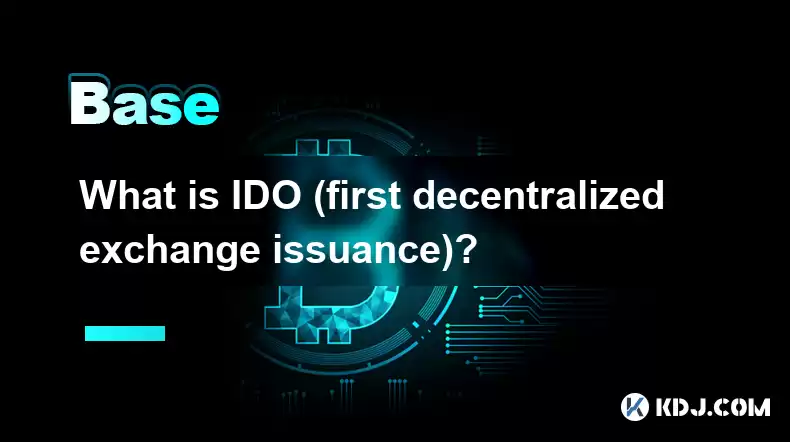
Key Points:
- IDOs (Initial Decentralized Offerings) are a method for cryptocurrency projects to raise capital, bypassing traditional venture capital and exchange listings.
- IDOs leverage decentralized exchanges (DEXs) to distribute tokens, offering a potentially fairer and more transparent fundraising process compared to Initial Coin Offerings (ICOs).
- Participation in IDOs often requires holding specific tokens on the DEX platform, staking them, or meeting other requirements set by the project.
- Risks associated with IDOs include rug pulls, scams, and the volatility of the cryptocurrency market.
- Understanding the project's whitepaper, team, and tokenomics is crucial before participating in an IDO.
What is IDO (Initial Decentralized Exchange Issuance)?
An Initial Decentralized Offering (IDO) represents a novel approach to fundraising within the cryptocurrency space. Unlike traditional Initial Coin Offerings (ICOs), which often relied on centralized platforms, IDOs utilize decentralized exchanges (DEXs) to distribute a project's native tokens. This shift towards decentralization aims to foster a more transparent and equitable distribution process, mitigating some of the concerns associated with ICOs. The core concept involves offering newly created cryptocurrency tokens directly to investors via a DEX, eliminating the intermediary role of venture capitalists and centralized exchanges.
How do IDOs work?
The mechanics of an IDO vary depending on the specific platform and project. However, a common theme involves a lottery system or a tiered allocation based on pre-existing engagement with the DEX or the project itself.
- Tiered Allocation: Projects might prioritize investors who hold a certain amount of the DEX's native token or have participated in previous events. This system aims to reward loyal users and prevent bot-driven participation.
- Lottery System: Some IDOs employ a lottery-style allocation, randomly selecting participants from a pool of applicants. This approach strives to ensure fairness and prevent large-scale manipulation.
- Staking Requirements: Certain IDOs may require participants to stake their tokens for a defined period before the IDO launch. This mechanism helps to gauge genuine interest and reduces the likelihood of short-term speculation.
- Whitelist: Many IDOs operate on a whitelist system. To be eligible, potential investors need to complete specific tasks, such as completing KYC (Know Your Customer) procedures, joining community groups, or engaging with the project's social media presence. This helps to filter out potential bots and less serious investors.
What are the advantages of IDOs over ICOs?
IDO's decentralized nature offers several key advantages over their centralized ICO counterparts.
- Enhanced Transparency: The use of a public, transparent blockchain eliminates the potential for hidden fees or manipulative practices often associated with centralized platforms. All transactions are recorded and verifiable on the blockchain.
- Fairer Distribution: IDOs often aim for a more equitable distribution of tokens, reducing the concentration of tokens in the hands of a few early investors or privileged parties.
- Reduced Risk of Scams: While not foolproof, the decentralized nature of IDOs can make it harder for fraudulent projects to operate undetected, as the project’s code and transactions are open for community scrutiny.
What are the risks associated with IDOs?
Despite their potential benefits, IDOs still carry inherent risks:
- Rug Pulls: Malicious projects can launch an IDO, collect funds, and then disappear, leaving investors with worthless tokens. Thorough due diligence is crucial to mitigate this risk.
- Smart Contract Vulnerabilities: Bugs in the smart contracts governing the IDO can lead to unexpected outcomes or loss of funds. Security audits of smart contracts are essential before participation.
- Market Volatility: The cryptocurrency market is highly volatile, and the value of newly launched tokens can fluctuate dramatically. Investment in IDOs should be considered high-risk.
- Lack of Regulatory Oversight: The decentralized nature of IDOs often means they operate outside the regulatory framework of traditional financial markets.
How to participate in an IDO?
Participating in an IDO typically involves several steps:
- Research: Thoroughly research the project, its team, and its whitepaper to assess its viability and potential.
- Choose a reputable platform: Select a DEX with a proven track record of security and transparency.
- Meet eligibility requirements: Fulfill any requirements set by the project, such as holding specific tokens, staking, or completing KYC.
- Participate in the IDO: Follow the instructions provided by the platform and project to participate in the token sale.
Common Questions and Answers:
Q: What is the difference between an IDO and an ICO?
A: ICOs utilize centralized platforms for token sales, while IDOs leverage decentralized exchanges (DEXs), promoting greater transparency and potentially fairer token distribution.
Q: Are IDOs regulated?
A: The regulatory landscape surrounding IDOs is still evolving and varies significantly by jurisdiction. Many IDOs operate in a relatively unregulated space.
Q: How can I minimize the risk of participating in an IDO?
A: Thorough research, including reviewing the project’s whitepaper, team expertise, and community engagement, is crucial. Also, choosing reputable DEXs and understanding the risks involved is vital.
Q: What are some popular IDO launchpads?
A: Several platforms facilitate IDOs, including but not limited to BSCPad, Polkastarter, and others. The landscape is constantly changing, so staying updated on reputable launchpads is crucial. Always conduct independent research before using any platform.
Q: What does "rug pull" mean in the context of IDOs?
A: A rug pull is a fraudulent scheme where developers of a cryptocurrency project suddenly withdraw all the invested funds, leaving investors with worthless tokens.
Q: Is it possible to lose money participating in an IDO?
A: Yes, investing in IDOs is inherently risky, and there's a substantial chance of losing money due to market volatility, project failure, or scams. Only invest what you can afford to lose.
Disclaimer:info@kdj.com
The information provided is not trading advice. kdj.com does not assume any responsibility for any investments made based on the information provided in this article. Cryptocurrencies are highly volatile and it is highly recommended that you invest with caution after thorough research!
If you believe that the content used on this website infringes your copyright, please contact us immediately (info@kdj.com) and we will delete it promptly.
- XRP ETF, Bitcoin ETF, and Japan: A New Era for Crypto Investing?
- 2025-08-08 14:30:12
- Crypto, Congress, and Bills: Navigating the Regulatory Landscape in 2025
- 2025-08-08 14:30:12
- Union Jack Oil, Unused Gas, and Bitcoin: A New York Minute on UK's Crypto-Energy Play
- 2025-08-08 14:50:12
- Bitcoin Price: Bullish Flag Points to $123K Breakout?
- 2025-08-08 14:50:12
- Crypto Group's WNBA Dildo Toss: Meme Coin Mania or Just Plain Dumb?
- 2025-08-08 14:55:13
- Stablecoins, Hong Kong, and On-Chain Finance: Navigating the Regulatory Maze
- 2025-08-08 12:30:12
Related knowledge
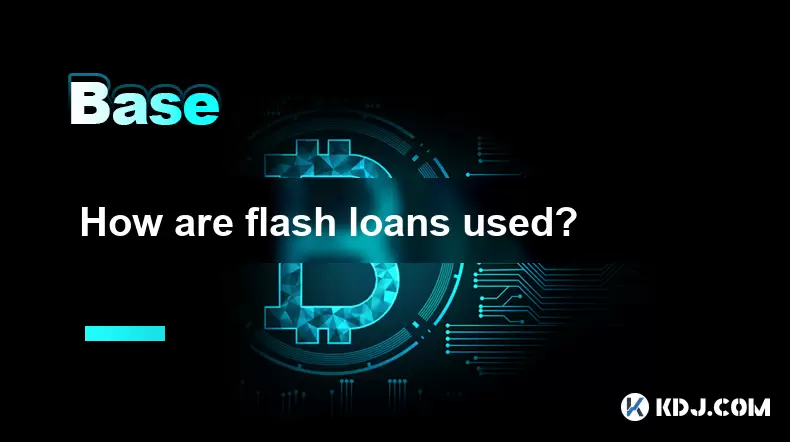
How are flash loans used?
Aug 08,2025 at 01:08pm
Understanding Flash Loans in Decentralized FinanceFlash loans are a unique innovation within the decentralized finance (DeFi) ecosystem, allowing user...
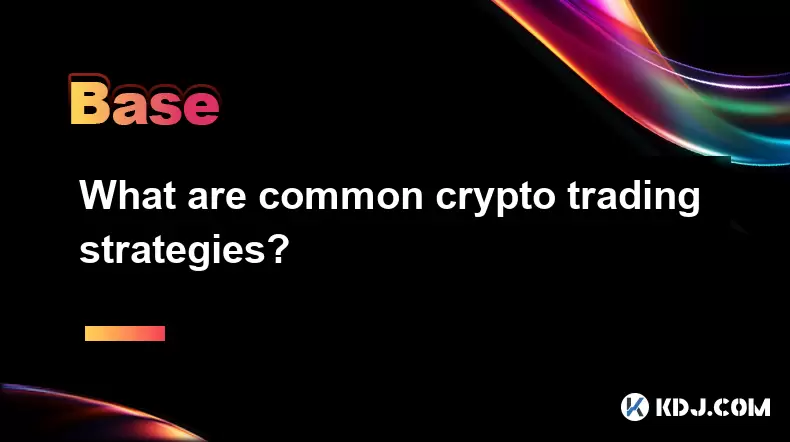
What are common crypto trading strategies?
Aug 08,2025 at 12:42pm
Understanding Trend Following in Crypto TradingTrend following is one of the most widely adopted crypto trading strategies due to its simplicity and a...
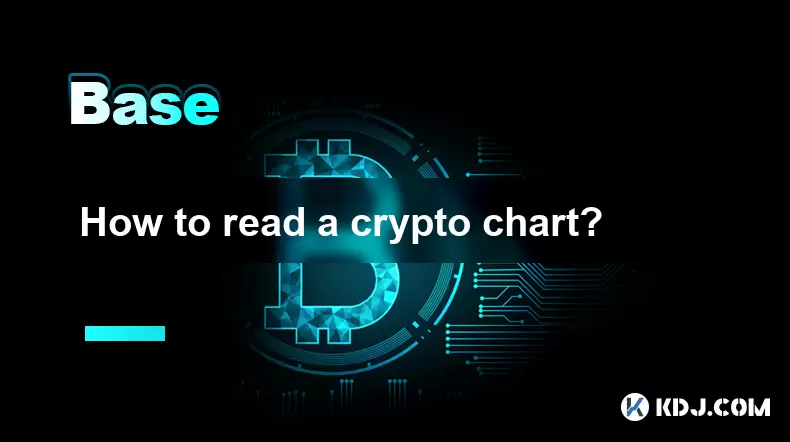
How to read a crypto chart?
Aug 08,2025 at 10:35am
Understanding the Basics of a Crypto ChartA crypto chart is a visual representation of the price movements of a cryptocurrency over time. These charts...
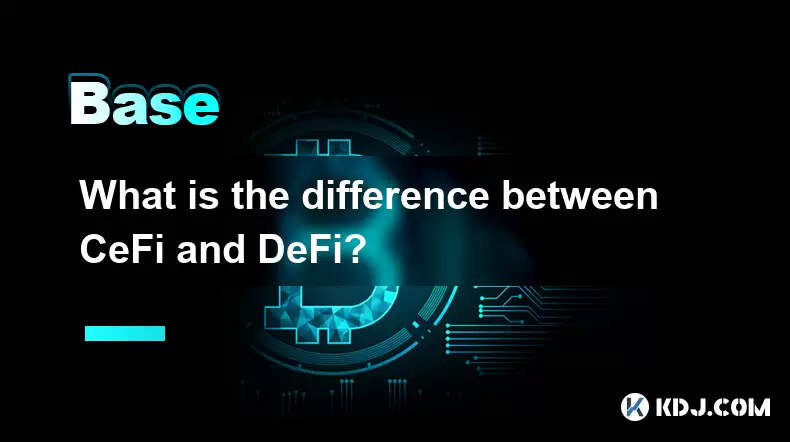
What is the difference between CeFi and DeFi?
Jul 22,2025 at 12:28am
Understanding CeFi and DeFiIn the world of cryptocurrency, CeFi (Centralized Finance) and DeFi (Decentralized Finance) represent two distinct financia...
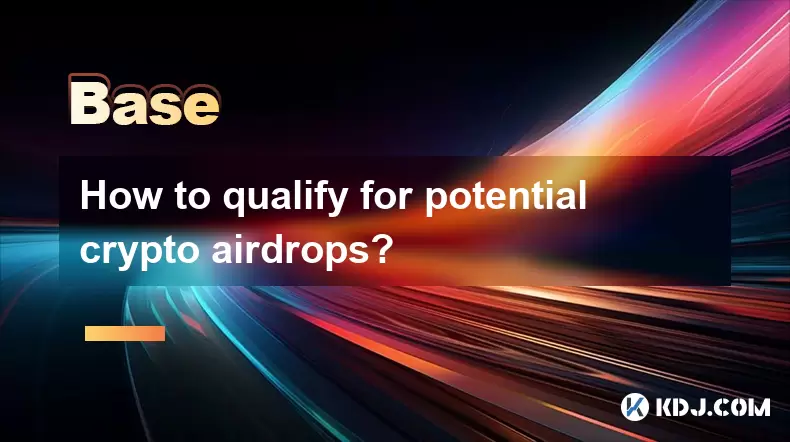
How to qualify for potential crypto airdrops?
Jul 23,2025 at 06:49am
Understanding What Crypto Airdrops AreCrypto airdrops refer to the distribution of free tokens or coins to a large number of wallet addresses, often u...
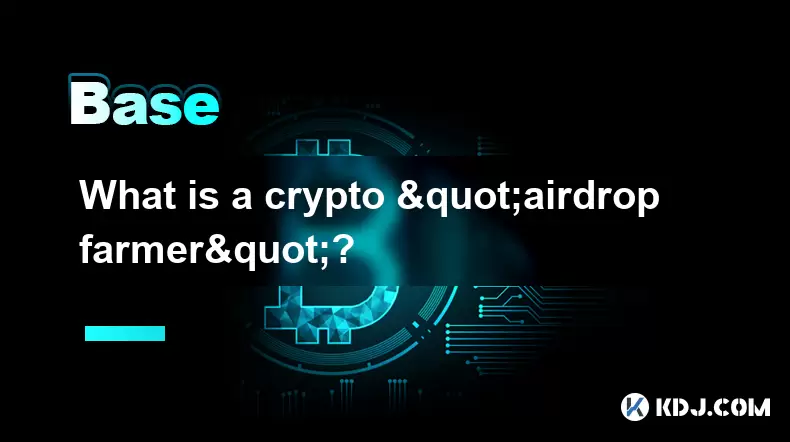
What is a crypto "airdrop farmer"?
Jul 24,2025 at 10:22pm
Understanding the Role of a Crypto 'Airdrop Farmer'A crypto 'airdrop farmer' refers to an individual who actively participates in cryptocurrency airdr...

How are flash loans used?
Aug 08,2025 at 01:08pm
Understanding Flash Loans in Decentralized FinanceFlash loans are a unique innovation within the decentralized finance (DeFi) ecosystem, allowing user...

What are common crypto trading strategies?
Aug 08,2025 at 12:42pm
Understanding Trend Following in Crypto TradingTrend following is one of the most widely adopted crypto trading strategies due to its simplicity and a...

How to read a crypto chart?
Aug 08,2025 at 10:35am
Understanding the Basics of a Crypto ChartA crypto chart is a visual representation of the price movements of a cryptocurrency over time. These charts...

What is the difference between CeFi and DeFi?
Jul 22,2025 at 12:28am
Understanding CeFi and DeFiIn the world of cryptocurrency, CeFi (Centralized Finance) and DeFi (Decentralized Finance) represent two distinct financia...

How to qualify for potential crypto airdrops?
Jul 23,2025 at 06:49am
Understanding What Crypto Airdrops AreCrypto airdrops refer to the distribution of free tokens or coins to a large number of wallet addresses, often u...

What is a crypto "airdrop farmer"?
Jul 24,2025 at 10:22pm
Understanding the Role of a Crypto 'Airdrop Farmer'A crypto 'airdrop farmer' refers to an individual who actively participates in cryptocurrency airdr...
See all articles

























































































